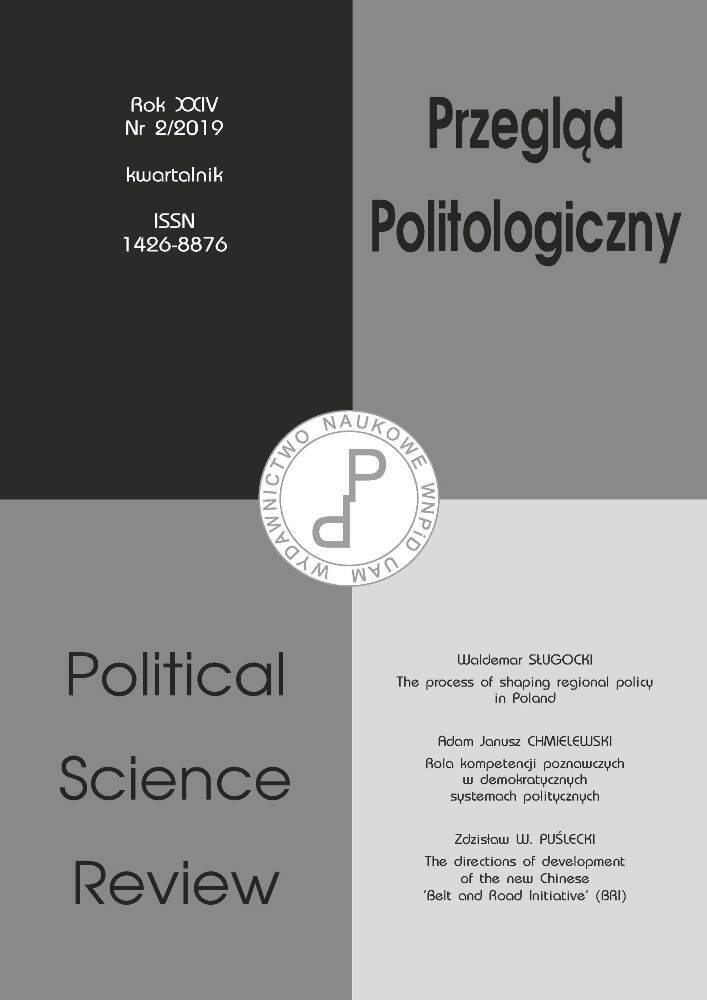Abstract
The article concerns the issue of developing electromobility in Poland against the background of plans related to shaping the national energy policy. Electric vehicles are an important challenge for transport policy in the world. Their growing popularity is a response to the problems of environmental pollution and is associated with activities to ensure sustainable development. Poland is a State that intends to move towards the development of electromobile transport. An appropriate strategy was prepared for this purpose, and the law was established and the responsible institutions were identified in this regard. Unfortunately, the main idea that accompanies electromobility – that is, ecology, does not go hand in hand with plans in the field of Polish energy policy. According to official government programs, energy production in Poland until 2040 is to be based on the use of coal. This means that electric vehicles will be powered by the so-called “dirty energy”. The hypothesis of the article is that the development of electromobility in Poland is difficult to justify in terms of a positive impact on the natural environment and climate protection in a situation where energy production is based on coal. Without changes in energy policy, electromobility “in Polish” is a failed idea, because it does not meet the basic assumptions – that is, it will not contribute to reducing the negative impact of transport on the environment.
References
AMiS (2019), Raport: Wiek samochodów w Europie, „Auto Motor i Sport”, nr 4, s. 24.
Barrett S. R., Speth R. L., Eastham S. D., Dedoussi I. C., Malina R., Keith D. W. (2015), Impact of the Volkswagen emissions control defeat device on US, “Environmental Research Letters”, vol. 10, ss. 1–10.
Breetz H. L., Salon D. (2018), Do electric vehicles need subsidies? Ownership costs for conventional, hybrid, and electric vehicles in 14 U.S. cities, “Energy Policy”, vol. 120 (September), ss. 238–249.
Canals Casals L., Martinez-Laserna E., García B., Nieto N. (2016), Sustainability analysis of the electric vehicle use in Europe for CO2 emissions reduction, “Journal of Cleaner Production”, vol. 127 (July), ss. 425–437.
Castorama (2017), Polityka zrównoważonego rozwoju, https://www.castorama.pl/castorama/zrownowazony-rozwoj/polityka-zrownowazonego-rozwoju, 26.03.2019.
Cecere G., Corrocher N., Guerzoni M. (2018), Price or performance? A probabilistic choice analysis of the intention to buy electric vehicles in European countries, “Energy Policy”, vol. 118 (July), ss. 19–32.
Franke T., Krems J. F. (2013), What drives range preferences in electric vehicle users?, “Transport Policy”, vol. 30 (November), ss. 56–62.
Egbue O., Long S. (2012), Barriers to widespread adoption of electric vehicles: An analysis of consumer attitudes and perceptions, “Energy Policy”, vol. 48 (September), ss. 717–729.
Gawlikowska-Fyk A. (2017), Samochody elektryczne w Niemczech – jazda pod prąd, „Biuletyn PISM”, nr 105 (1547).
Ghezlouna A., Saidane A., Merabeta H. (2017), The COP 22 New commitments in support of the Paris Agreement, “Energy Procedia”, vol. 119 (July), ss. 10–16.
Groger O., Gasteiger H. A. Suchsland J.-P. (2015), Review – Electromobility: Batteries or Fuel Cells?, “Journal of The Electrochemical Society”, 162 (14), ss. 2605–2622.
GUS (2018), Raport: Energia, Główny Urząd Statystyczny, Warszawa.
Ikea (2018), Ikea Sustainability Strategy – People & Planet Positive, Inter Ikea Systems B.V., https://www.ikea.com/ms/pl_PL/pdf/people_planet_positive/IKEA_Sustainability_Strategy_People_Planet_Positive_v3.pdf, 26.03.2019.
Kasianiuk K. (2017), Analiza systemowa jako narzędzie w badaniach instytucji politycznych, „Studia Polityczne”, nr 2 (45), ss. 169–192.
Komisja Europejska (2011), Biała księga: Plan utworzenia jednolitego europejskiego obszaru transportu – dążenie do osiągnięcia konkurencyjnego i zasobooszczędnego systemu transportu, COM (144) 2011.
Komisja Europejska (2017), Komunikat: Europa w ruchu. Program działań na rzecz sprawiedliwego społecznie przejścia do czystej, konkurencyjnej i opartej na sieci mobilności dla wszystkich, COM (283) 2017.
Krawiec K., Krawiec S. (2017), Rozwój elektromobilności w Polsce. Uwarunkowania, cele i bariery, „Studia Ekonomiczne. Zeszyty Naukowe Uniwersytetu Ekonomicznego w Katowicach”, nr 332, ss. 17–24.
Ministerstwo Energii (2016), Plan rozwoju elektromobilności w Polsce. Energia do przyszłości (dokument przyjęty przez Radę Ministrów 16 marca 2017 r.).
Ministerstwo Energii (2017), Krajowe ramy polityki rozwoju infrastruktury paliw alternatywnych (dokument przyjęty przez Rada Ministrów 29 marca 2017 r.).
Ministerstwo Energii (2018), Polityka energetyczna Polski do 2040 roku, projekt v. 1.2., 23.11.2018, https://www.gov.pl/web/energia/polityka-energetyczna-polski-do-2040-r-zapraszamy-dokonsultacji, 18.03.2019.
Ministerstwo Energii (2018a), Wnioski z analiz prognostycznych dla sektora energetycznego – załącznik nr 1 do Polityki energetycznej Polski do 2040 roku, projekt v. 1.2., 23.11.2018, https://www.gov.pl/web/energia/polityka-energetyczna-polski-do-2040-r-zapraszamy-do-konsultacji, 18.03.2019.
Ministerstwo Infrastruktury i Rozwoju (2017), Strategia na rzecz Odpowiedzialnego Rozwoju do roku 2020 (z perspektywą do 2030 r.) (dokument przyjęty przez Radę Ministrów 14 lutego 2017 r.).
Motofocus.pl (2018), Polacy kupują samochody coraz odpowiedzialniej, https://motofocus.pl/informacje/nowosci/67951/polacy-kupuja-samochody-coraz-odpowiedzialniej, 18.03.2019.
Murawski J., Szczepański E. (2014), Perspektywy dla rozwoju elektromobilności w Polsce, „Logistyka”, nr 4, ss. 2249–2258.
Prud’homme R., Koning M. (2012), Electric vehicles: A tentative economic and environmental evaluation, „Transport Policy”, vol. 23 (September), ss. 60–69.
Raport FPPE-CE (2018), Napędzamy polską przyszłość, Fundacja Promocji Pojazdów Elektrycznych i Cambridge Econometrics, Warszawa.
Raport PZPM (2019), Raport 2018. Branża motoryzacyjna, Polski Związek Przemysłu Motoryzacyjnego, Warszawa.
Schroeder A., Traber T. (2012), The economics of fast charging infrastructure for electric vehicles, „Energy Policy”, vol. 43 (April), ss. 136–144.
Tomaszewski K. (2017), Autonomous vehicles as a challenge for the transport policy of the European Union, „Przegląd Europejski”, nr 4 (46), ss. 76–95.
Ustawa (2018), Ustawa o elektromobilności i paliwach alternatywnych, Dz. U. 2018, poz. 317.
Ustawa (2018a), Ustawa o zmianie ustawy o biokomponentach i biopaliwach ciekłych oraz niektórych innych ustaw, Dz. U. 2018, poz. 1356.

